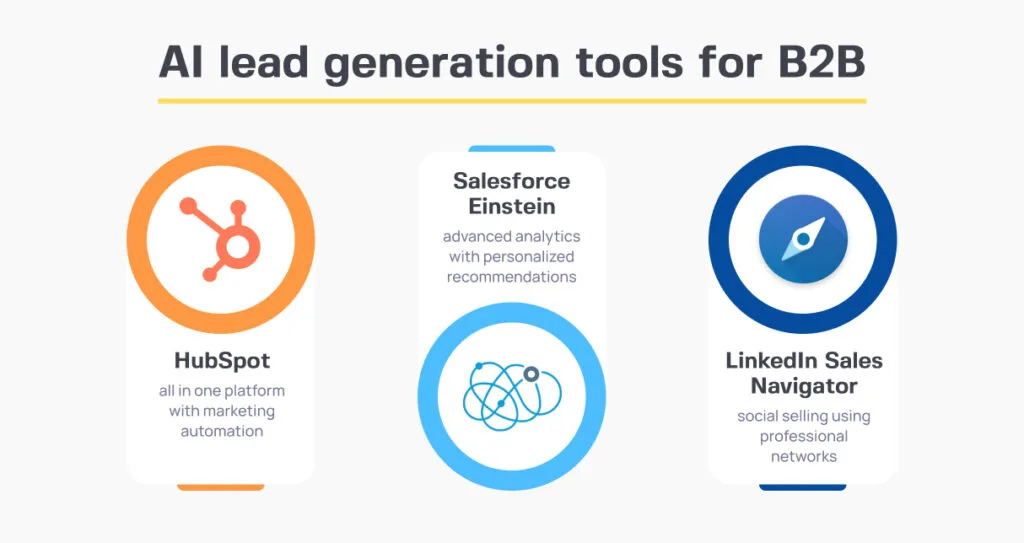Top benefits of AI Automation For B2B for B2B customer engagement
Wiki Article
The Future of B2B: Using AI Automation to Drive Success
The landscape of B2B is shifting as business significantly turn to AI automation for calculated benefit. This makeover assures to boost performance and customer engagement with innovative innovations. The integration of these tools is not without its challenges. Understanding how organizations can navigate this evolving terrain will be vital for future success. What aspects will determine the performance of AI in this industry? The answers may redefine conventional business versions.Recognizing AI Automation in B2B
As organizations increasingly seek efficiency, recognizing AI automation in B2B comes to be vital. AI Automation For B2B. AI automation refers to using fabricated intelligence modern technologies to boost and simplify organization processes. In the B2B industry, this includes the combination of AI devices to take care of jobs such as information analysis, client interactions, and supply chain operations. By leveraging artificial intelligence and all-natural language handling, companies can enhance precision, minimize human error, and quicken decision-making. AI automation facilitates the handling of huge volumes of data, making it possible for services to remove beneficial understandings and maximize their operations. As organizations navigate this technical landscape, a detailed grip of AI automation's capabilities will certainly equip them to stay responsive and affordable to market demandsKey Advantages of AI Automation for Companies
While numerous businesses grapple with enhancing operational needs, AI automation presents countless advantages that can markedly boost their efficiency. One considerable advantage is performance; AI systems can carry out recurring tasks faster and with higher accuracy than humans, thus releasing and lowering mistakes up staff members for even more strategic initiatives. Furthermore, AI automation allows data-driven decision-making by examining substantial datasets swiftly, supplying understandings that educate company methods. Cost decrease is one more crucial benefit, as automation lessens labor costs and maximizes source allowance. AI can enhance scalability, permitting businesses to adjust to market modifications promptly. Ultimately, the assimilation of AI automation fosters technology, allowing business to remain affordable in a rapidly developing landscape.Changing Customer Experiences With AI
AI is improving customer experiences by enabling individualized interactions and enhancing involvement. Through the application of anticipating analytics, businesses can expect customer requirements and choices, resulting in much more tailored solutions. Furthermore, simplifying assistance processes with AI modern technology enhances efficiency and fulfillment, eventually changing the overall customer trip.Individualized Interactions and Interaction

Predictive Analytics Application
As services significantly seek to boost client experiences, executing predictive analytics has actually emerged as a critical technique in the B2B industry. By leveraging data-driven insights, organizations can expect customer demands and choices, enabling them to customize their offerings better. Anticipating analytics makes use of historical information and advanced formulas to anticipate future habits, enabling companies to determine possible obstacles and chances. This aggressive technique not just improves customer contentment however also fosters commitment by supplying pertinent and timely solutions. Furthermore, predictive analytics aids in source appropriation, making sure that marketing efforts are focused on high-value leads. Inevitably, the integration of anticipating analytics furnishes B2B business with the devices essential to change consumer communications and drive lasting success in an increasingly affordable landscape.Improving Support Procedures
Enhancing consumer experiences in the B2B industry extends past anticipating analytics; enhancing assistance processes plays an essential duty. By incorporating AI-driven remedies, organizations can automate regular queries and improve feedback times, resulting in increased consumer contentment. Chatbots and virtual aides supply 24/7 assistance, attending to customer requires without delay and reducing the concern on human representatives. This automation enables teams to concentrate on complicated issues, promoting even more meaningful communications. In addition, AI tools can evaluate assistance information to identify patterns and areas for renovation, making sure continuous improvement of service high quality. Minarik AI. As organizations take on these modern technologies, they position themselves as customer-centric and receptive, inevitably driving commitment and company development in a progressively affordable landscapeImproving Workflow and Processes
Streamlining operations and procedures in B2B settings is vital for improving overall performance. By maximizing process effectiveness and automating regular tasks, companies can reduce hand-operated errors and maximize important sources. This shift not just improves efficiency however also allows groups to concentrate on tactical efforts that drive development.
Enhancing Workflow Performance
Enhancing operations effectiveness is important for companies seeking to reduce functional prices and boost efficiency. By assessing existing processes, organizations can recognize bottlenecks and redundancies that impede efficiency. Carrying out structured procedures improves communication and partnership amongst groups, making sure that tasks are finished much more swiftly. Making use of data-driven understandings enables companies to make informed decisions that improve operations discover this further. Furthermore, taking on incorporated innovations can help with smooth info circulation, reducing the risk of errors and delays. As companies embrace these changes, they not just foster a much more active work setting but likewise position themselves to react rapidly to market demands. Eventually, focusing on process effectiveness allows organizations to allocate resources properly, driving long-term success in an increasingly competitive landscape.Automating Routine Jobs
Many companies are progressively turning to automation to manage routine tasks, acknowledging its possible to considerably enhance operational performance. By releasing AI-driven solutions, firms can simplify recurring tasks such as data entry, invoice processing, and client inquiries. This shift not just minimizes human error however likewise releases up beneficial worker time, enabling staff to concentrate on strategic campaigns and value-added tasks. Furthermore, automation can improve reaction times and solution uniformity, leading to enhanced consumer complete satisfaction. As services navigate a competitive landscape, leveraging automation for routine tasks comes to be essential for preserving and enhancing process agility. Eventually, this strategy promotes development and drives growth, positioning organizations for long-lasting success in the progressing B2B setting.Enhancing Decision-Making Via Data Insights
As businesses browse an increasingly complicated landscape, leveraging information understandings becomes necessary for notified decision-making. Minarik AI. By utilizing ai-driven tools and innovative analytics, organizations can change raw information right into actionable intelligence. This enables them to identify trends, projection market changes, and maximize strategies based on real-time info. Boosted decision-making processes depend on data visualization techniques, permitting stakeholders to conveniently make and interpret complex datasets swift, evidence-based choices. Furthermore, insights stemmed from client behavior and market characteristics equip firms to tailor their offerings, improving consumer contentment and driving growth. Eventually, harnessing information understandings not only boosts decision-making effectiveness but likewise positions services to stay competitive in a quickly advancing marketplaceGetting Over Difficulties in AI Application
Although AI implementation holds the assurance of considerable operational renovations, organizations often face a myriad of challenges that can prevent progress. Trick challenges consist of data quality concerns, as lots of business battle with insufficient or inconsistent datasets necessary for reliable AI training. Furthermore, resistance to alter within the labor force can restrain the fostering of AI modern technologies, as staff members may be afraid task displacement or do not have the necessary abilities. Budget plan restrictions likewise present a challenge, limiting investment in the required framework and talent. Additionally, integrating AI systems with existing processes can be complex, demanding substantial time and resources. Overcoming these challenges demands a strategic method that consists of thorough training, adjustment monitoring, and a dedication to continual improvement in AI effortsFuture Fads: The Following Frontier in B2B Automation
While the landscape of B2B automation remains to evolve, arising patterns are poised to redefine how organizations operate. The integration of advanced expert system will certainly help with extra tailored consumer experiences, allowing services to customize solutions exactly to client demands. The rise of anticipating analytics will certainly allow companies to expect market changes and maximize decision-making processes. Automation of routine jobs via robotic procedure automation (RPA) will improve efficiency, decreasing functional expenses considerably. Additionally, the fostering of blockchain modern technology promises enhanced transparency and protection in deals. As these innovations gain traction, companies will increasingly leverage AI-driven understandings to foster collaboration, enhance supply chains, and improve overall productivity, marking a transformative shift in the B2B landscape.Often Asked Concerns
What Kinds of Businesses Can Profit Most From AI Automation?

Exactly How Can Local Business Carry Out AI Automation Effectively?
Small businesses can carry out AI automation efficiently by recognizing repetitive tasks, selecting easy to use tools, guaranteeing sufficient training for staff members, and progressively incorporating remedies to maximize workflows while checking efficiency and changing approaches based upon feedback.What Are Usual False Impressions About AI in B2B?
Common mistaken beliefs about AI in B2B include the belief that it is only for large business, that it ensures instant results, which it can completely change human decision-making as opposed to boosting it.Exactly How Does AI Automation Influence Employee Duties and Task Protection?
AI automation reshapes staff member functions by enhancing repeated jobs, fostering performance and technology. While some fear task loss, it usually produces opportunities for upskilling and new settings, inevitably enhancing work safety and security with included value and productivity.What Skills Are Needed to Take Care Of AI Automation Projects?
To handle AI automation tasks, people need strong analytical skills, task monitoring proficiency, efficiency in information evaluation, understanding of artificial intelligence concepts, effective interaction abilities, and versatility to quickly transforming technological environments. These abilities assure successful implementation.As businesses significantly look for efficiency, understanding AI automation in B2B comes to be crucial. AI automation promotes the handling of large volumes of information, allowing organizations to draw out valuable understandings and maximize their operations. While many businesses grapple with increasing operational demands, AI automation offers various benefits that can considerably boost their performance. Automation of routine jobs through robot process automation (RPA) will improve performance, reducing functional prices substantially - Growth Systems For B2B. Manufacturing, logistics, and consumer solution companies can profit most from AI automation
Report this wiki page